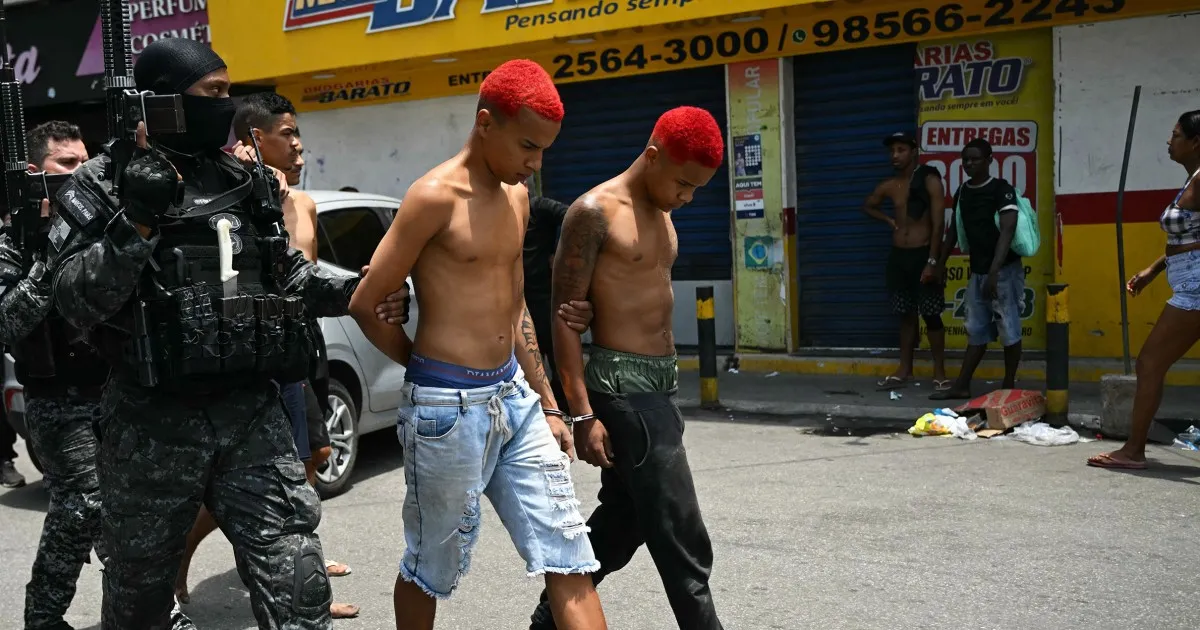
On Tuesday, approximately 2,500 police and soldiers launched a significant raid on a notorious drug-trafficking gang in Rio de Janeiro, resulting in the arrest of 81 suspects and violent confrontations that left at least 60 suspects and four police officers dead. This extensive operation was aimed at dismantling the infamous Red Command gang, which has been a prominent player in the drug trade within the sprawling low-income favelas of Complexo de Alemão and Penha.
The police operation was one of the most violent in Brazil's recent history. It involved helicopters and armored vehicles as law enforcement targeted the gang's stronghold. According to state officials, this operation marked the largest of its kind in the city's history, with Rio's State Governor Claudio Castro stating in a video posted on X that 60 criminal suspects were neutralized. The operation also resulted in the seizure of 93 rifles and over half a ton of drugs.
The civil police of Rio confirmed the fatalities, stating on X that four officers lost their lives during the raid. They condemned the attacks by criminals, asserting that such actions would not go unpunished. Additionally, there were reports of an unknown number of injuries among both police and suspects.
The United Nations' human rights body expressed horror at the operation's deadly outcome, urging effective investigations and reminding Brazilian authorities of their obligations under international human rights law. César Muñoz Acebes, the director of Human Rights Watch in Brazil, described the events as a "huge tragedy" and emphasized the need for the public prosecutor's office to investigate each death thoroughly.
Footage circulating on social media depicted scenes of chaos, with fire and smoke rising from the favelas as gunfire echoed through the streets. In response to the raid, Rio's Education Department announced the closure of 46 schools in the affected neighborhoods, and the nearby Federal University of Rio de Janeiro canceled night classes, advising students to seek shelter.
In retaliation to the police operation, suspected gang members blocked roads in northern and southeastern Rio, commandeering at least 70 buses to create blockades. This disruption caused significant damage, as reported by the city's bus organization, Rio Onibus.
This operation followed a year-long investigation into the Red Command gang. Governor Castro, representing the conservative opposition Liberal Party, criticized the federal government for not providing adequate support to combat crime, indirectly targeting the administration of leftist President Luiz Inácio Lula da Silva. In a show of unity, Gleisi Hoffmann, the Lula administration's liaison with parliament, acknowledged the need for coordinated action while highlighting recent federal efforts to combat organized crime.
The Red Command gang has expanded its influence in the favelas over recent years, and Rio has a long history of lethal police raids. Notable past operations include one in March 2005 in which 29 people were killed in the Baixada Fluminense region, and another in May 2021 that resulted in 28 deaths in the Jacarezinho favela. Experts like Luis Flavio Sapori, a sociologist at Pontifical Catholic University of Minas Gerais, noted that while this recent operation was unprecedented in scale, it mirrored past tactics that often fail to apprehend the true masterminds behind the violence.
According to Sapori, the approach lacks an effective strategy, stating, "It's not enough to go in, exchange gunfire, and leave." He criticized the cycle of targeting lower-ranking gang members, who can quickly be replaced, calling for a more strategic public security policy in Rio de Janeiro.
The operation was also condemned by the Marielle Franco Institute, a nonprofit founded by the family of the slain councilwoman to advocate for the rights of favela residents. They characterized the police actions as a "policy of extermination," arguing that such measures turn the daily lives of Black and poor people into a dangerous gamble.
As Brazil grapples with issues of crime and public safety, this raid highlights the complexities and challenges of policing in a city plagued by violence and inequality. The aftermath of this operation will likely prompt further discussion on the strategies employed by law enforcement and the ongoing struggle for human rights in the region.